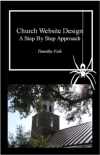
And Thy House
Extra Feature: High Res Image

History of
Cane Creek
Association
by D. F. Magruder
Limiting Website Traffic
Written By: Timothy Fish Published: 2/2/2005
Most Christians will agree that church is for everyone. A church should not be selective about who it lets in the door on Sunday morning. A church should open its door to people of all races, all walks of life and all classes of people. A church should love the people but not the sin. If we could, it would be nice if South Park Baptist Church could just redirect the traffic on Crowley Road into our parking lot on Sunday morning, hold it there for a couple of hours and then let it go when our services were over. I am sure that you will agree that the concept sounds a little far fetched, but the truth is that we want everyone to be welcome at our church.
For most churches any visitor who steps through the door is a prospect. There are a few exceptions, such as when someone is visiting from out of town, but even these people are welcome and we are happy to be of any help we can. Even though local churches may do things to help reach the lost in the entire world there are inherent limitations on the people who walk through the door of the church building. South Park Baptist Church is located in Fort Worth, Texas. During my childhood I was a member of the Zalma Missionary Baptist Church in Zalma, Missouri. I never attended South Park Baptist Church until I moved away from home. To my knowledge, no member of South Park Baptist Church or any other person in Fort Worth has ever attended the Zalma Missionary Baptist Church besides me. While both churches are strong supporters of local, state, national and foreign missions the primary sphere of influence is localized. For a person from Zalma to visit a church in Fort Worth he must first travel to Fort Worth and then visit the church.
Websites do not have the inherent limitations in who will visit them. While we often speak of visiting a website, the truth is that the website visits the user. Because you are reading this page you would be classified as a visitor to my site, but what you see as the website is currently located on your computer. Yes, the website is located on a server somewhere, but when you decided to visit this site the server sent data to your computer rather than taking you to the site. You can be located in any part of the world and still be able to see this site. Because of on-the-fly translation tools, you don’t even have to be able to read English to be able to understand what this site is saying.
Many churches have the idea that since their church services are for everyone then their website should be for everyone as well. Since all visitors to the church services are prospects then all visitors to the website must be prospects as well. This is flawed thinking because while the church has limitations on whom it can reach, the church website can literally be seen in all parts of the world. At first this sounds great, but how do we continue to train people with whom we have no physical contact? I believe that the best approach for a local church website is to take efforts to limit traffic to the same people that the church can physically reach and let churches and missionaries in other areas reach out to the others. If a church finds that it has traffic from areas that are outside its immediate reach it can use links to other church websites and contact information for other churches to help the people in those areas.
There are some things that should be available to everyone. If your church includes its doctrinal statement and the plan of salvation on its website you should make it readily available to everyone. When considering some of the other content to include on the website you will want to make sure it draws people to your church rather than just to your website. There is tons of information available on the web that tells you how to get more people to look at your website. Most of this information is written for people who want to get rich by doing nothing and the main goal of the author is to attract people to his websites. Very little of this information translates into having more people in the pews on Sunday morning, and isn’t that one of the main reasons your church wants a website?
One of the recommendations I have seen for getting more people to visit your church website is to put some games in a children’s area. The site even provided a link to a site (probably one of theirs) that had some games to use. While this method may increase the traffic to you site it is very unlikely that the increase in traffic will bring more people to your church. Schemes to attract people to your site can be fun, but they may not be effective. I have visited the Orbitz website a number of times because they used a game to get me to click on their ad, but I have never actually used the Orbitz website. The same can be true for a church website. If you want your congregation to get familiar with your website a gimmick can be very effective. You might try hiding something on one of the pages and announce a prize for the first person who finds it. The prize does not have to be large because most people will look for the fun of the challenge rather than for the prize. But when it comes to getting people in the pews, gimmicks can be tricky. When people are looking for a church they are not looking for a church that plays games, though some are easily sidetracked. Some churches grow to large numbers by compromising on the truth and telling people how great they are. In spite of the recent movement to try to attract people by entertaining them, people are still looking for something meaningful in their lives. The backbone of every church must be that it preaches the truth. If this cannot be said of your church then you should close your doors can find one that does.
For many webmasters the Google page ranking system is the all important criteria to let them know how well they are doing. For a church website this is not nearly as important. If you live in a small community with only five hundred computers with internet access in a fifteen mile radius around your church building the page rank system is pretty meaningless. Your website may show up for anyone that is looking for a church in your area no matter what the rank it holds in the Google system. This is good, but since you want people in your area to visit your website and then visit your church, you might consider sending a letter (yes, I mean by the US Postal Service) to all of the people in the area telling them about your church and about your website. The website should be designed to provide more information that it would be possible to send in the letter. While schemes to increase page rank can generate unwanted traffic to your site the people who visit the site because of the letters are all prospects.
I don’t use this method, but one method that seems to have potential is to provide information about attractions and businesses in the community. The idea is that people will be looking for something else in you area and are able to find it because you have provided the information on you website. This can be effective because the people find not only the information they are looking for but information about your church as well. These people are often people who live in the area, so there greater hope that these people will eventually find their way into your church building. The biggest probably I see with this approach is that to be the most effective the church website would have to include some businesses that may be considered undesirable by the church. For example, a Baptist church is not likely to want to list a local bar on its website, even though we want to reach the people who frequent the bar. The local Bingo hall would be an undesirable listing, but we want to reach the people who are spending time playing Bingo. If your church is in a dry community with no legalized gambling then you may find this method effective and usable.
When you provide information about your church, be sure to include all of the information. I placed South Park’s address on every webpage. The address includes the street name, the city and the zip code. Most people will search for a church by city name, but some may us the zip code or street name. By including all of the information about the location of the church you can help to insure that a person can find your website no matter how he chooses to search for a church. I have seen some church websites that included a long list of zip codes, but the search engine seems to place more importance on a zip code that is included in an address rather than a zip code that is included with a bunch of other five digit numbers. According to Overture there where only thirty-six searches for 76134 in December 2004. There are some zip codes that have no searches for that same month. Some of these searches may have been for a church in the area, but even if all of them were I do not consider it to be a significant enough number to base attracting people to our website solely on zip codes.
Some church websites include information about everything under the sun. Some of this information is very offensive to people who are looking for a church. I do not mean to say that a church should water down the truth so it is not offensive, but visitors to websites can be all kinds of people. Some of these people are not Christians, some are new Christians, and some have been in church since the time they were born. Think about how you would talk to these people face-to-face. Would you talk to them the same way? Most of us would not. For non-Christians we consider the most important thing to be getting them saved. For new Christians we can start talking about other things, but we still need to be careful which words we choose and start with the basics. For Christians who have been around for a while we can talk about the heavier doctrinal issues. A church website that is intended to attract visitors to your church should stay away from the details of heavy doctrinal issues and instead focus on why people should visit your church. If you want to state your opinion about an offensive issue you should use a separate website. I have looked at several church website recently and many of them do little to convince me to visit their church. If fact, many of them give me the impression that they are angry about something.
The upside of providing information about a lot of topics is that it increases traffic flow to your website, but unless it is focused directly at your target audience it may not be effective. I believe that there is some room for information that is not focused at your target audience, but I think you should be careful that it doesn’t distract from the message of your website. I have found several church websites that take a stand on the Landmark Baptist church succession debate. Some of these sites support the idea of Baptist succession and others take a stand against it, but nearly all of them are poorly written. The impression I got from many of these sites was that the author was saying I can’t prove it, but I know I’m right and whoever disagrees with me is stupid for believing the way he does. The topic is a hobby of mine and while I stand on the Landmark side of the issue and my research has made that stand even more firm, I have come to the conclusion that there is neither sufficient proof in the body of evidence currently available to prove historically that an unbroken line of Baptist doctrine believing churches exists, nor is there sufficient proof to say that one doesn’t exist. A person who does not take the time to do the research can easily come to the conclusion that either side is correct. I think it is detrimental to a church to include this discussion or other similar subjects on a church website, but I would like to see better written papers on other sites concerning the subject. Few people want to attend a church that is fighting among themselves or with other churches. Some papers that are intended to be informative rather than argumentative can often give the impression that a fight is taking place. It is better to teach some issues from the pulpit or in a class so the people can hear the love in the speaker’s voice. Websites are good at presenting cold hard facts, but do not show the love behind the facts very easily.
My observations concerning hot topics on church websites is based in part on the feeling I have when I drive past a church sign that has the three letters “KJV” on it. I believe the King James Version is a good translation, but I have often wondered what would happen if I walked into one of these churches carrying another translation. Would the pastor take me aside and explain to me why I was wrong to use anything besides the King James Version? Would someone tell me I had to leave it outside? Would someone hand me a Bible and tell me that I should use it? Perhaps no one would say anything to me, but I would hear whispers all around me. Maybe I would hear some kid say, “Look Mommy! He’s using Satan’s bible.” And then hear, “Shhh! Hush Johnny! He doesn’t know any better.”
I suspect that in most of these churches I would not receive that response at all, but that is the impression I get looking at the importance they place on the translation they use. The same can be true for websites as well. Decide on the most important message of your website and stick with it throughout the site. This applies to church pages and websites in general. If you want to tell people that they are welcome at your church then tell them that and don’t get off on deep subjects. If you want your website tell people where you stand on the Landmark issue then you should tell them that in as calm a manner as you can, but don’t try introducing them to Jesus with the same website. Most of the people who are interested in the Landmark issue have already made a decision concerning Jesus and will probably not read what you have to say about salvation.
The key to getting the traffic you want is to focus your website on that traffic. Provide information that people can use and avoid presenting contentious issues in a disagreeable manner. Many people focus on page rank, but if you focus on providing useful information for you target audience the page rank will take care of itself. Yes, there are ways to inform your audience of the existence of your site, but the most important thing is that you provide your audience with the information they need.
Editor's Note: The author of this article has written a book titled Church Website Design.
www.timothyfish.com



